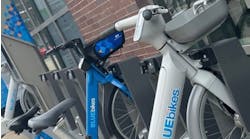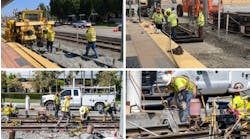DC: World Bank Report Confirms Investment in Public Transit Critical to Combating Climate Change
A new World Bank report confirms that investing in public transit is key to fighting global warming, creating jobs and stimulating economies says the Amalgamated Transit Union.
“It’s in our power to avert the dangers of global warming by implementing sound policies that protect the planet, create jobs and opportunities, and leave the Earth a better, cleaner place for the future. And investment in, and commitment to, public transit can achieve those goals," says Larry Hanley, ATU International president. “This report confirms it’s time for urgent action – we can’t continue to pretend that climate change is fictitious. Let’s stop kicking the globe around the field like a political soccer ball.”
The report, “Adding Up the Benefits”, concludes that government policies that improve public transport and energy efficiency are climate-smart and could increase global economic output by more than $1.8 trillion per year. They also could help avert approximately 94,000 premature deaths from pollution-related diseases per year by 2030.
In the United States, automobile transportation is the second largest source of greenhouse gas emissions – the chief cause of climate change. Riding a bus, train or trolley rather than driving a car significantly reduces air pollution and emissions.
Buses, for example, emit 80 percent less carbon monoxide than a car. Rail emits almost none.
Communities that invest in public transit curb the nation's carbon emissions by 37 million metric tons annually -- equivalent to New York City, Washington, Atlanta, Denver and Los Angeles combined not using electricity.
Investment in public transit stimulates local economies and businesses. Every $1 billion spent on public transportation operations supports or creates more than 41,000 jobs.
“Hurricanes and tornadoes are destroying our cities, and polar ice caps are melting while Congress has turned its back on the one thing that could help while also invigorating our economy – public transit,” Hanley continued. “In short, there’s no more effective way to clean the planet and promote stronger and healthier communities than to investment in public transit.”


